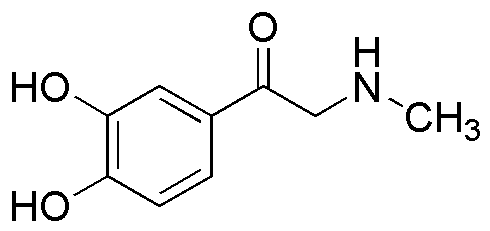Adrenalone is widely utilized in research focused on:
- Cardiovascular Research: It plays a crucial role in studying heart function and blood pressure regulation, helping researchers understand conditions like hypertension and heart failure.
- Neuroscience: This compound is used to investigate neurotransmitter activity, particularly in relation to stress responses and mood disorders, aiding in the development of new treatments.
- Pharmaceutical Development: Adrenalone serves as a precursor in synthesizing various pharmaceuticals, enhancing drug formulation processes for more effective medications.
- Biochemical Assays: It is employed in assays to measure enzyme activity related to catecholamines, providing insights into metabolic pathways and disease mechanisms.
- Diagnostic Applications: The compound is utilized in developing diagnostic tests for adrenal gland function, assisting healthcare professionals in diagnosing adrenal disorders.
General Information
Properties
Safety and Regulations
Applications
Adrenalone is widely utilized in research focused on:
- Cardiovascular Research: It plays a crucial role in studying heart function and blood pressure regulation, helping researchers understand conditions like hypertension and heart failure.
- Neuroscience: This compound is used to investigate neurotransmitter activity, particularly in relation to stress responses and mood disorders, aiding in the development of new treatments.
- Pharmaceutical Development: Adrenalone serves as a precursor in synthesizing various pharmaceuticals, enhancing drug formulation processes for more effective medications.
- Biochemical Assays: It is employed in assays to measure enzyme activity related to catecholamines, providing insights into metabolic pathways and disease mechanisms.
- Diagnostic Applications: The compound is utilized in developing diagnostic tests for adrenal gland function, assisting healthcare professionals in diagnosing adrenal disorders.
Documents
Safety Data Sheets (SDS)
The SDS provides comprehensive safety information on handling, storage, and disposal of the product.
Product Specification (PS)
The PS provides a comprehensive breakdown of the product’s properties, including chemical composition, physical state, purity, and storage requirements. It also details acceptable quality ranges and the product's intended applications.
Certificates of Analysis (COA)
Search for Certificates of Analysis (COA) by entering the products Lot Number. Lot and Batch Numbers can be found on a product’s label following the words ‘Lot’ or ‘Batch’.
*Catalog Number
*Lot Number
Certificates Of Origin (COO)
This COO confirms the country where the product was manufactured, and also details the materials and components used in it and whether it is derived from natural, synthetic, or other specific sources. This certificate may be required for customs, trade, and regulatory compliance.
*Catalog Number
*Lot Number
Safety Data Sheets (SDS)
The SDS provides comprehensive safety information on handling, storage, and disposal of the product.
DownloadProduct Specification (PS)
The PS provides a comprehensive breakdown of the product’s properties, including chemical composition, physical state, purity, and storage requirements. It also details acceptable quality ranges and the product's intended applications.
DownloadCertificates of Analysis (COA)
Search for Certificates of Analysis (COA) by entering the products Lot Number. Lot and Batch Numbers can be found on a product’s label following the words ‘Lot’ or ‘Batch’.
*Catalog Number
*Lot Number
Certificates Of Origin (COO)
This COO confirms the country where the product was manufactured, and also details the materials and components used in it and whether it is derived from natural, synthetic, or other specific sources. This certificate may be required for customs, trade, and regulatory compliance.


